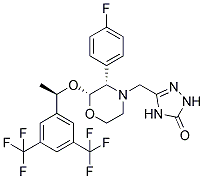All AbMole products are for research use only, cannot be used for human consumption.

Aprepitant (Emend) is an antiemetic chemical compound that belongs to a class of drugs called substance P antagonists (SPA). It mediates its effect by blocking the neurokinin 1 (NK1) receptor.Aprepitant has been shown to inhibit both the acute and delayed emesis induced by cytotoxic chemotherapeutic drugs by blocking substance P landing on receptors in the brains neurons.
| Cell Experiment | |
|---|---|
| Cell lines | human CAPAN pancreas, HEp-2 larynx, gastric 23132-87 and SW-403 colon carcinoma cells |
| Preparation method | Proliferation assays. Cell proliferation was evaluated using the tetrazolium compound 3-(4,5-dimethylthiazol-2-yl)-5-(3-carboxymethoxyphenyl)2-(4-sulfophenyl)-2H-tetrazolium, inner salt (MTS), according to the manufacturer’s instructions (CellTiter 96 Aqueous One Solution Cell Proliferation Assay). Cell numbers were quantified using a Coulter counter. Cells were cultured in 96-well plates: each well contained 104 cells in a total volume of 100 µl. Each assay included one plate The plate included blank wells (0 cells/0.1 ml), control wells (104 cells /0.1 ml), control wells with acetonitrylo, control wells treated with aprepitant and control wells treated with the most effective SP concentration and aprepitant. The plates were inoculated with aprepitant (5–70 µM for tumor cell lines) and were incubated for the first doubling time specific for each tumor cell line. The plates were also inoculated the most mitogenic exogenous SP nM concentration with the fifty-percent inhibition concentration (IC50) of aprepitant µM concentration approximately and without aprepitant for their first doubling times respectively. For the proliferation assay, 20 µl of the MTS reagent was added to each well 90 min before reading the samples on a multiscanner microplate reader (TECAN Spectra classic, Barcelona, Spain) at 492 nm. The quantity of product, as measured by optical density, is directly proportional to the number of living cells. |
| Concentrations | 5-70 µM |
| Incubation time | 2 days |
| Animal Experiment | |
|---|---|
| Animal models | acute cisplatin-induced emesis in ferrets |
| Formulation | Methocel or PEG 300 |
| Dosages | 0.3, 1, 3mg/kg |
| Administration | p.o. or i.v. |
| Molecular Weight | 534.43 |
| Formula | C23H21F7N4O3 |
| CAS Number | 170729-80-3 |
| Solubility (25°C) | DMSO 90 mg/mL |
| Storage | 2-8°C, protect from light |
| Related Neurokinin Receptor Products |
|---|
| GR203040
GR203040 is an orally active NK1 receptor antagonist with a pKi of 10.3. |
| Ezlopitant
Ezlopitant (CJ-11,974) is a selective, non-peptidic neurokinin-1 (NK-1)-receptor antagonist. |
| CP 122721 hydrochloride
CP 122721 hydrochloride is a potent, non-peptide and selective nonpeptide neurokinin NK1 antagonist, with a pIC50 of 9.8 for human NK1 receptor expressed in IM-9 cells. |
| Spantide II
Spantide II, an undecapeptide substance P (SP) analog, is a potent neurokinin-1 receptor (NK-1R) antagonist. |
| Substance P (7-11)
Substance P (7-11) is a C-terminal fragment of Substance P which can cause an increase in the intracellular calcium concentration. |
All AbMole products are for research use only, cannot be used for human consumption or veterinary use. We do not provide products or services to individuals. Please comply with the intended use and do not use AbMole products for any other purpose.


Products are for research use only. Not for human use. We do not sell to patients.
© Copyright 2010-2024 AbMole BioScience. All Rights Reserved.
